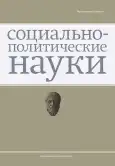Theoretical Approaches to Defining the State as Target of Strategic Instability
- Authors: Kaftan V.V.1, Molodtsov I.N.1
-
Affiliations:
- Financial University under the Government of the Russian Federation
- Issue: Vol 12, No 4 (2022)
- Pages: 22-29
- Section: Articles
- URL: https://journals.eco-vector.com/2223-0092/article/view/535748
- DOI: https://doi.org/10.33693/2223-0092-2022-12-4-22-29
- ID: 535748
Cite item
Abstract
The purpose of the research. The article is about the issues of strategic instability of modern states. Based on the analysis of the state as the most significant object of socio-political interaction and the primary goal for the technologies of organizing strategic instability, the authors typify various theories of the socio-humanitarian sciences on the formation of statehood on the principle of scientific rationality. This is necessary to determine the main directions of countering the influence of information and communication technologies of a destructive nature, used by Western political actors in order to destroy the subjectivity of the Russian Federation, intercept state administration and form hotbeds of socio-political instability. Conclusions. As a result of the study, the authors come to the conclusion that the modern Russia, needs to focus its main efforts on concentrating social actors’ powers, necessary resources, forces and means of information and communication in order to ensure effective security and sustainable regulation of social relations.
Full Text
About the authors
Vitaly V. Kaftan
Financial University under the Government of the Russian Federation
Email: kaftanvit@mail.ru
Dr. Sci. (Philos.), Professor; deputy Head of the Department of Mass Communications and Media Business. Moscow, Russian Federation
Igor N. Molodtsov
Financial University under the Government of the Russian Federation
Email: inmolodtsov@fa.ru
Cand. Sci. (Polit.), Associate Professor; Head of the Department of Mass Communications and Media Business. Moscow, Russian Federation
References
- Agamben J. Homo Sacer. Sovereign power and Naked life. Moscow: Europe, 2011.
- Berger P., Lukman T. Social construction of reality. A treatise on the sociology of knowledge. Moscow, 1995.
- Bloomer G. Collective behavior. In: Psychology of the masses. Saratov, 2001.
- Veber M. Economy and society. Moscow: Higher School of Economics, 2007.
- Ilyin I.A. On the essence of legal consciousness. In: Ilyin I.A. Coll. works. Moscow, 1994. Vol. IV.
- Lasswell G. The language of power. In: Political linguistics. Yekaterinburg, 2006. Issue 20.
- Message of the President of the Russian Federation to the Federal Assembly of Russia on 4 December, 2014. Website of the President of the Russian Federation [Electronic resource]. URL: http://www.kremlin.ru/transcripts/47173 (data of accesses: 16.07.2022).
- Saint-Simon A. Catechism of industrialists. Moscow: Librocom, 2011.
- Spencer G. Political writings. In 5 vols. Vol. I: Personality and the state: Experiments on the state, society and freedom. Chelyabinsk: Society, 2014.
- Stepin V.S. Theoretical knowledge. Moscow: Progress-Tradition, 2003.
- Filaret (Drozdov) st. Reasoning about the moral reasons for our incredible successes in the war of 1812-1813. Moscow Diocesan Vedomosti. 2002. № 9. (In Rus.)
- Freud Z. Totem and taboo. Psychology of primitive culture and religion. St. Petersburg: Lenizdat, 2014.
- Foucault M. It is necessary to protect society: A course of lectures delivered at the Collège de France in 1975-1976. St. Petersburg: Nauka, 2005.
- Foucault M. The Birth of Biopolitics. A course of lectures delivered at the Collège de France in the 1978-1979. St. Petersburg: Nauka, 2010.
- Engels F. The origin of the family, private property and the state. Moscow: Politizdat, 1976.
- Mann S. The reaction to chaos // Complexity, Global Politics, and National Security. Washington, D.C. 1998.
Supplementary files











